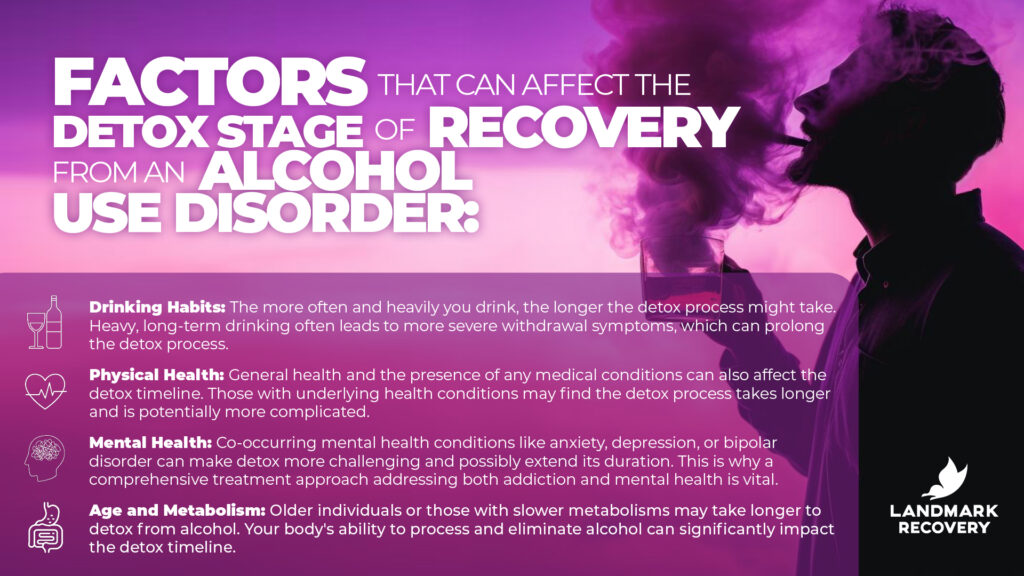Detoxing from alcohol typically takes one week to 10 days. However, the duration can vary significantly depending on the individual’s drinking habits, physical health, and mental state. For some, withdrawal symptoms may subside after a week, but for others, they can last for several weeks or even months.
At Landmark Recovery, we tailor our treatment plans to cater to each person’s unique needs. We understand that there’s no one-size-fits-all answer to the question, but we’re committed to guiding you every step of the way during this challenging journey.
Alcohol Detox: What to Expect
Alcohol detoxification is a process that unfolds in three main stages, which are characterized by a distinct set of symptoms and potential health risks. It should be noted that alcohol withdrawal can be potentially dangerous, and even lethal, without proper medical supervision.
The Three Stages of Detox
The initial stage of alcohol detoxification, typically occurring 6 to 12 hours after the last drink, is characterized by mild withdrawal symptoms. These symptoms may include anxiety, insomnia, nausea, abdominal pain, and vomiting. Individuals in this stage may also experience physical tremors and heart palpitations. In rare cases, minor hallucinations may occur.
Following the initial stage is the moderate withdrawal stage, which generally sets in between 12 and 48 hours after the last drink. During this stage, the individual’s blood pressure and body temperature may rise, and their heart rate may become irregular. Other common symptoms at this stage include confusion, sweating, irritability, and severe mood swings.
The final stage, severe withdrawal or delirium tremens, tends to occur 48 to 72 hours after the last drink. This stage is characterized by a range of severe symptoms, including hallucinations, fever, seizures, profound confusion, and agitation.
The timelines provided here are general and can vary depending on a variety of factors, such as the individual’s overall health and the extent of their alcohol dependence. Furthermore, not everyone will experience every symptom listed. While some people may only experience mild withdrawal symptoms, others may face severe complications, such as seizures or delirium tremens.
It is strongly advised that detoxification be carried out under the careful monitoring of medical professionals, who can manage the symptoms and intervene in case of severe complications. After the detox phase, ongoing treatment and support are vital for maintaining abstinence and supporting recovery from alcohol addiction. Such treatment may include individual therapy, group counseling, medication, and participation in support groups.
First Stage – Mild Withdrawal (6-12 hours after last drink)
- Anxiety
- Insomnia
- Nausea
- Abdominal pain
- Vomiting
- Tremors
- Heart palpitations
- Minor hallucinations (rare)
Second Stage – Moderate Withdrawal (12-48 hours after last drink)
- Increased blood pressure
- Increased body temperature
- Unusual heart rate
- Confusion
- Sweating
- Irritability
- Severe mood swings
Third Stage – Severe Withdrawal/Delirium Tremens (48-72 hours after last drink)
- Hallucinations
- Fever
- Seizures
- Severe confusion
- Agitation
Factors Affecting Detox Duration
There are several factors that can influence how long it takes to detox from alcohol. These include:
- Drinking Habits: The more often and heavily you drink, the longer the detox process might take. Heavy, long-term drinking often leads to more severe withdrawal symptoms, which can prolong the detox process.
- Physical Health: General health and the presence of any medical conditions can also affect the detox timeline. Those with underlying health conditions may find the detox process takes longer and is potentially more complicated.
- Mental Health: Co-occurring mental health conditions like anxiety, depression, or bipolar disorder can make detox more challenging and possibly extend its duration. This is why a comprehensive treatment approach addressing both addiction and mental health is vital.
- Age and Metabolism: Older individuals or those with slower metabolisms may take longer to detox from alcohol. Your body’s ability to process and eliminate alcohol can significantly impact the detox timeline.
The Importance of Professional Detox Treatment
Attempting to detox from alcohol without professional help can be dangerous, even life-threatening. Withdrawal symptoms can be severe, including potentially fatal conditions like delirium tremens.
At Landmark Recovery, our medical detox program ensures patient safety while minimizing discomfort. We provide round-the-clock care, medication to ease withdrawal symptoms in medically necessary instances, and comprehensive support to help patients transition into a life of recovery.
Recovery IS Possible
Detox is the first, critical step on the path to recovery from alcohol addiction. Though it can be a challenging process, remember that you don’t have to face it alone.
At Landmark Recovery, we are dedicated to providing personalized care and robust support throughout the detox process and beyond. We believe that recovery is possible for everyone, no matter how severe their addiction or how long it takes to detox from alcohol.
So, if you or a loved one is struggling with alcohol addiction, don’t hesitate to reach out. Let us help you take the first step towards a healthier, alcohol-free future. Call us at 888-448-0302 today to learn more about our services and how we can help. Your journey to recovery starts here.

Choose Recovery Over Addiction
We're here 24/7 to help you get the care you need to live life on your terms, without drugs or alcohol. Talk to our recovery specialists today and learn about our integrated treatment programs.





